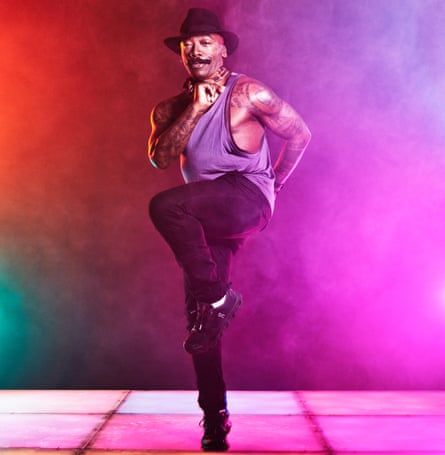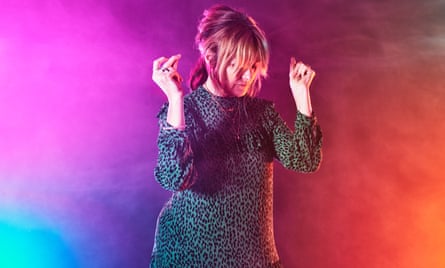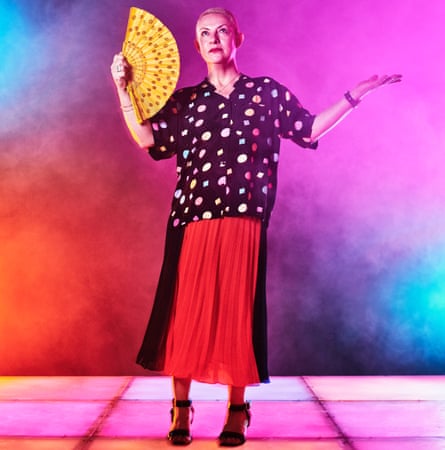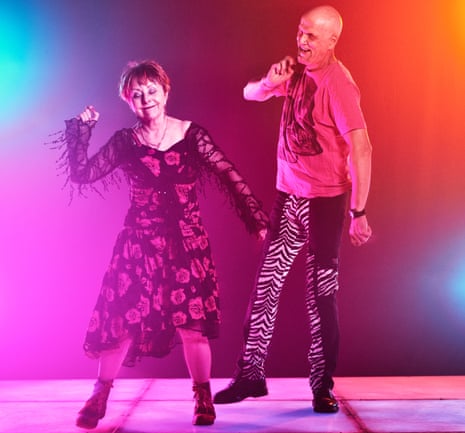Nightclubbing is seen as a young person’s game. Sightings of older clubbers – such as the elderly Polish couple who went viral after a night out at London’s Fabric in 2016 – are considered a novelty. But the septuagenarian tourists – who partied until 5am – are not alone.
A recent poll by ticketing platform Eventbrite found that more than 3.7 million Britons aged over 45 go clubbing every week. The nation’s nightlife may not be in rude health overall, but certain DJs, clubs and clubbers have endured. Fabric turned 20 this year, and DJs such as Danny Rampling and Terry Farley are still drawing crowds 30 years on from the summer of love that made their name. From nostalgia nights to dance festivals, older clubbers – such as Mick Jagger, 76, spotted at gay club night Horse Meat Disco earlier this year – are finding their second wind.
Typically, clubbing loses its appeal in our early 30s; 31 is the age at which most give up, according to a 2017 survey. But for those who do keep dancing, it can be much more than just a night out. What starts as an act of teenage transgression becomes radical in middle age. We talked to six older clubbers who refuse to hang up their dancing shoes. Have they still got the moves?
‘It’s like galloping across the universe in a spaceship’
Brett, 70, and Sylvia Van Toen, 69, retirees (above)
Sylvia Our first love is hard house – it attracts a different, much younger crowd. We go to hard house clubs and festivals, after discovering psytrance at Glastonbury in the mid-90s and thinking, “This is it.” The music builds up tension; you’re waiting for this particular tune and then suddenly it drops in and you’re going yes, yes, yes! Then it carries you along. It’s a bit like galloping across the universe in a spaceship.
I got married at 18 and had children young. I was a housewife. I didn’t know a lot about music, I didn’t dance. Brett and I were in our late 30s when we got together. I had two young children and so we decided to live apart, and we’ve kept doing that. We see each other during the week but get excited about going clubbing together on Fridays. It’s like going on a date.
Brett We are very lucky. Many couples we know don’t like the same music. We go clubbing once a fortnight. It’s intense. It’s hard work. The clubs often run from 11pm to early morning. There are more afternoon clubs now, which I love.
If we go to a dance festival, we make as much effort as we can to get sleep. We take a campervan, which is good because parking tends to be away from the main field. We don’t drink alcohol, just water. We don’t do afterparties; that would hurt. We don’t have any plans to retire, though that might change as we age.
It’s a social thing. We went to heavy techno clubs and it was too dark to dance because you couldn’t see what the hell was going on. So that didn’t work for us. Dancing with other people is important. Clubbing has taught me a way of being I don’t think I would have found otherwise. I used to be curmudgeonly but I have learned a lot of acceptance from hanging around young people. There is much to admire about them. They are also complimentary and it’s a lot of fun. It gives you energy.
‘There’s no judgment: it’s utopia’
Roy Brown, 56, songwriter and club host

I’m a Brummie lad. I went to my first shebeen [unlicensed bar] in Birmingham, aged 13. It was this small venue behind a shop with huge sound systems in dark rooms, pumping with reggae and ska music. Seeing guys and girls dancing really close to each other, the music pounding, the smell of weed, a lightbulb went off in my head. I thought, this is amazing. That’s why I’m still doing it.
I knew the music – reggae, jazz, funk, blues – because that’s what my parents played at home. My parents were Jamaican and every Caribbean house has these family gatherings with music and food and dancing. That warm place they created in their houses is what I’m trying to emulate when I go clubbing: that womb, that happiness. No one can hurt or harm you because you are with like-minded people.
I moved to London at 18 in 1981, where my cousin Claudette introduced me to a group of fashionistas and club kids. They are still my friends. My aunt lived close to a huge club called Bolts. I walked past it one evening and there was a long queue of clones: gay men dressed identically in check shirts and Levi’s 501s. I had the same epiphany as in the shebeen: I saw like-minded people.
Some of Claudette’s friends sussed me out. Juicy (real name Ronald) came up to me and said: “What’s your game then?” They took me to my first gay bar and it was full steam ahead after that. My motivation was really good music. If there were hot guys there, brilliant. Drugs were a huge part of it. The majority of clubbers were white men but the only thing that mattered was that you stuck to the dress code.
I’m still on the clubbing scene. I started out on the door at the central London club Kinky Gerlinky in 1989. Now I’m a host at the Eagle in south London, where I have my own night, Soul on Saturday. I was MC and host for a club in Ibiza a few summers ago. They fly you out Friday morning for Saturday and Sunday night. I thought, can I do this? I am not 19. I’d aged 20 years. But because of the music and the amazing time, I lost 40 more.
I grew up Methodist and clubbing is like going to church. I still go out now if a night is euphoric. It’s human nature to look for something uplifting. There’s no judgment, just inclusivity. It’s my idea of utopia.
‘That moment a beat drops and everyone’s smiling: it’s wicked’
Victoria Saunders, 50, hairdresser

I still want to go out and listen to good music played loud. But now I’m older, I don’t want to go to a big busy nightclub. I think, I can’t be arsed, actually. You walk in and you’re told you’ve got to queue here or go here if you want to smoke a fag. I’m an adult, I can manage myself.
When I first went clubbing, it was lawless. In 1988, I was 18 and Ibiza was happening, it was the summer of love. That kickstarted it for me. When I went to Houghton dance music festival in Norfolk last year, I saw people from different points in my clubbing career. It’s nice to see people who still have that affinity.
I’ve always been more of an afterparty girl; I prefer it when all the wallies have gone home. I’d rather take my time and go out at about midnight, ease myself in and then hit a dancefloor.
Hairdressers like me are like Vikings; we can just do it. I remember coming home, having two hours’ sleep, then getting up and going to work. Now it shows more, on my face, after a couple of days. I hit Wednesday and I think, oof. But people tell me I look good for my age. I’ve pickled myself. When you’ve had so much fun and such a laugh going out, that also shows.
I go to a club called Pikes in Ibiza, where Wham! shot the video for Club Tropicana. I like to properly lose myself in music – that moment a beat drops and everyone’s smiling because they know it, that feeling of oneness: it’s wicked.
I was at a house party recently and my friend was up dancing. She said, “If I don’t do this now, I’ll be dancing in the aisles of Tesco.” It’s rare to find those moments as you get older, but 30 years of clubbing means it’s something that’s deep in you. You hear good music and you just want to dance.
‘After we scattered my stepdad’s ashes, I needed to get to Horse Meat Disco’
Amanda Freeman, 56, music publicist

I’m straight, but I prefer gay clubbing. It started in the early 2000s, when I went to places such as the Joiners Arms in east London with gay friends. It was a completely different world.
My friend Dan opened a gay bar in east London, Dalston Superstore, in 2009; by then I had been single a long time. It was a nonjudgmental space. There was no stigma attached to being a woman of my age as there could be in a straight environment; at a straight club, I’d be lucky if they let me in.
I’ve had a couple of difficult years. My mother has multiple sclerosis and my stepfather had dementia. I’m an only child, so I’ve been juggling all of this. My stepfather died in March. The weekend we scattered his ashes, I remember thinking, when I get home I’m going out to Horse Meat Disco. If I’ve been through a tough time, going out is the way to put myself back on track.
A lot of the younger people I’ve met out clubbing have been incredibly supportive. Not to say that my older friends haven’t, but they have kids and their own stuff going on. It seems easier for millennials to make those approaches, to ask me how my mum is doing, how I am. I’ve been hugely grateful for that.
I am happy to go out on my own, which is empowering. I can go to regular places and see people I know, or chat to people I’ve not met before. The music is important. My nickname is Lady D’Amanda because I’m very forward about asking the DJ for certain tracks. I’m first on the dancefloor and get people to dance with me. It’s always done in a joyful way.
I can’t bear the idea that there is an age at which you should stop. I feel more comfortable in my 50s than I did in my 40s. I chose not to be in a relationship and nobody in this community has ever questioned that. They admire people who have ploughed their own furrow, and a club night was held in my honour in January.
I hope I am an ally. I’m a music publicist and I am always available if LGBTQ artists or acts want help or advice. I’ve suddenly acquired a tribe: the community is made up of many different people, ages and persuasions. It doesn’t matter. It’s about what you bring to it. It’s a small world but it’s a really important one to me. A doorman once said to me, “You’re an icon”. That’s a lovely thing to be.
‘Drugs aren’t my thing. Someone asked what I’d had and I showed them my sandwich’
Suddi Raval, 49, music technology teacher

Acid house took over my life at 15, in 1986. The music was on the radio. Smiley faces – the acid house symbol – popped up on the news. House music has melodies and basslines but acid house was abstract, bendy, weird. It was like music from another world. It just grabbed my attention.
There was a week that changed my life. I was walking down the street in my home town, Ashton-under-Lyne. I was too young to go out but I dressed as if I was on the acid house scene: long hippy hair, a jumper by French brand Chipie. This guy called Kelvin came up to me. He could tell from my clothes that I was into that music and said: “You need to go to the Hacienda and the Blackburn raves warehouse parties.” I said: “I’d love to but I wouldn’t know how.” He said he’d take me, and he did.
I couldn’t believe it when I set foot in the Hacienda in Manchester. There were a couple of thousand people as into it as I was. I didn’t know everyone was off their heads, drugs were not my thing. One time at the raves, someone asked what I’d had. I didn’t know they meant drugs. I reached into my bag and pulled out my butty box, a pile of cheese and ham sandwiches and a can of Coke – you can’t dance all night on an empty stomach.
The only nights I wouldn’t go to the Hacienda were when it was closed. I’ve never stopped. As I get older, young people think I am either the DJ, a promoter or a drug dealer. I’m usually the only brown face in a club. I’ve always been in a minority; there were so few Indian, Pakistani or Asian clubbers. But I’ve always felt 100% safe.
I live in London now and go out a couple of times a month to clubs across the UK. I pick up my friend Sarah and drive to the Attik in Liverpool. It’s not about nostalgia; I go to dance to new music. It’s difficult to get back to normality if you stay up to 6am, so I don’t stay out late. I’m a teacher, so I have to function at 100%. My clubbing gives me credibility with my students. I’ve not been clubbing with them, though they’ve asked.
I met my wife when I was in London for an acid house night. She was concerned I might be into drugs. She’s come out clubbing with me, but she’s a doctor so she’s usually on call. She’s not a convert but she’s not against it. Our wedding in 2017 turned into a rave. It couldn’t have worked if she’d thought, who is this man-child obsessed with dance music?
My mum found it really cute that I had smiley faces all over my bedroom as a teenager. When I visited her up north recently, she showed me a smiley face emoji on her phone. “Look, Suddi,” she smiled, “acid!’” I said, “Yes, Mum, you are bang on! That is acid!” I was so proud.
